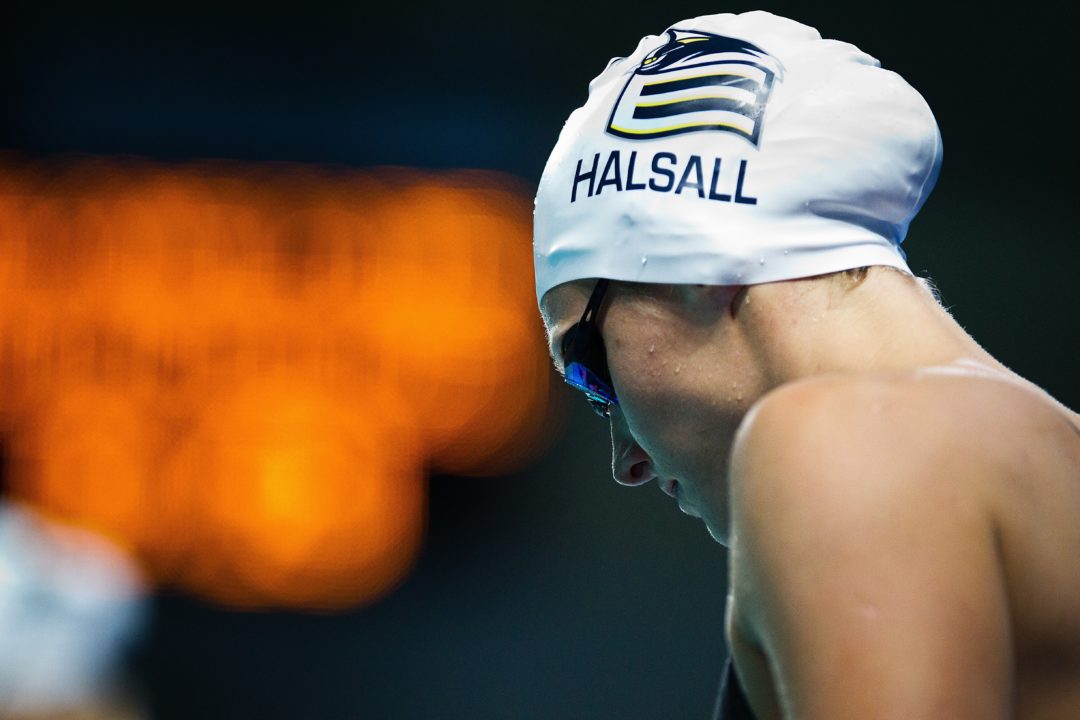Great Britain’s top sprinter, Fran Halsall, ended the first meet at London’s Olympic pool with a huge thrill for the British faithful.
Yesterday, in the international final of the women’s 50 ffree, the Netherlands’ Marleen Veldhuis put up a great mark of 24.49 to lead the world. On Saturday, Halsall made quick work of that mark with a 24.13 victory. That’s just .02 seconds away from Halsall’s British Record in the event and ties for the 12th-fastest in history. This is a race that will be wide-open at the Olympics (both because of the nature of the race and because of the parity), but Halsall now takes the inside track as this swim ties the legendary textile-best swim of Inge de Bruijn set in the year 2000 – which is the oldest textile-best mark on the books.
This would stand as a British Open Record – meaning the fastest time ever swum on British soil.
A full video of this race can be seen here.
Behind Halsall was Amy Smith in 2nd in 24.80, which is another outstanding time. She dropped half-a-second off of her lifetime best at this meet. This makes her the 3rd-best swimmer in her country’s history, and the Brits probably now have the 2nd-best sprint duo in the world (behind the Dutch). Both are true sprinters from the very start – Halsall gets a ton of power off of the block and is the only swimmer to have separated herself by the 2nd dolphin kick, and Smith is all over the fast-twitch with a brilliant reaction. Both swimmers will, naturally, earn spots on the Olympic Team in this race.
What’s better is that there’s more coming down the shoot – 16-year old Jessica Lloyd took 3rd in 25.69, and in fact three teenagers went 25.8 or better in this race.
The action didn’t slow down in the men’s 1500, which was not highlighted as a star race for this meet but the top swimmers did show up huge. Daniel Fogg leapfrogged his way to honors of the country’s best distance swimmer when he swam a 14:55.30. He’s only the second man to go sub-15 in this race in 2012.
This time is a full 11-seconds better than his lifetime best…set all the way back in 2008. This is entirely due to a maturity in his training as his pacing hasn’t consistently changed from the previous swim. He was about a second faster on each leg of this swim – where he had previously gone 58’s, he went 57’s. Where he had previously gone 1:01’s, he went 1:00’s. From first to last length, this was an even improvement distribution.
David Davies, the National Record holder, took second in 15:00.73 to also easily clear the Olympic Qualifying Time. That’s nowhere near his best time (set as a teenager in the Athens Olympics), but is six seconds better than we’ve seen him the last two years. This is a good bounceback for him after some issues with chronic fatigue forced him out of last year’s World Championships.
In the only international final of the final session, South Africa’s Devon Brown won in 15:17.66.
Closing Thoughts on the Meet
Overall, this was a wildly successful meet for the Brits. Everyone who needed to earn a qualification did early. There were some ups-and-downs in this meet. The backstrokers didn’t put up times they’re capable of, though I think that all three qualified in the events they needed to. The 100 butterfliers (Halsall, Ellen Gandy) were outstanding and showed that they can still hang for medals even though Sarah Sjostrom pushes the world faster-and-faster. The final day was a high-point both for the British women and British men, which will leave the entire squad with a positive feeling. And Rebecca Adlington was a monster as usual.
The men’s sprinters could have been better. Adam Brown is most likely to go after qualifying in the second round of qualifying in June, as he will be wanting a spot in the 50 free. Simon Burnett said that he wasn’t interested in anything more than focusing on his relay swims. British Swimming is left with an interesting decision for their men’s 400 free relay – neither Grant Turner nor Liam Tancock was in the top 4 of the 100 free. That relay doesn’t final without those two.
The improvements in British swimming across-the-board is evident. Ieuan Lloyd and Daniel Fogg in the distance freestyles. The two early breakouts of the meet are evidence that this is a growing program, rather than one relying on the same stars year-after-year (breaststroker/sprinter Craig Benson and women’s IM’er Aimee Wilmott).
The British qualifying system, which makes a whole lot of sense for a country in their position, is finally being figured out. Swimmers have gone after the first meet hard, and now will settle down into four months of hard training to again hit an ideal taper at the Olympics. A best-case scenario sees this team with about 7 Olympic medals. Five certainly seems realistic, and blowing past their three pool medals from 2012 is a slam-dunk.
